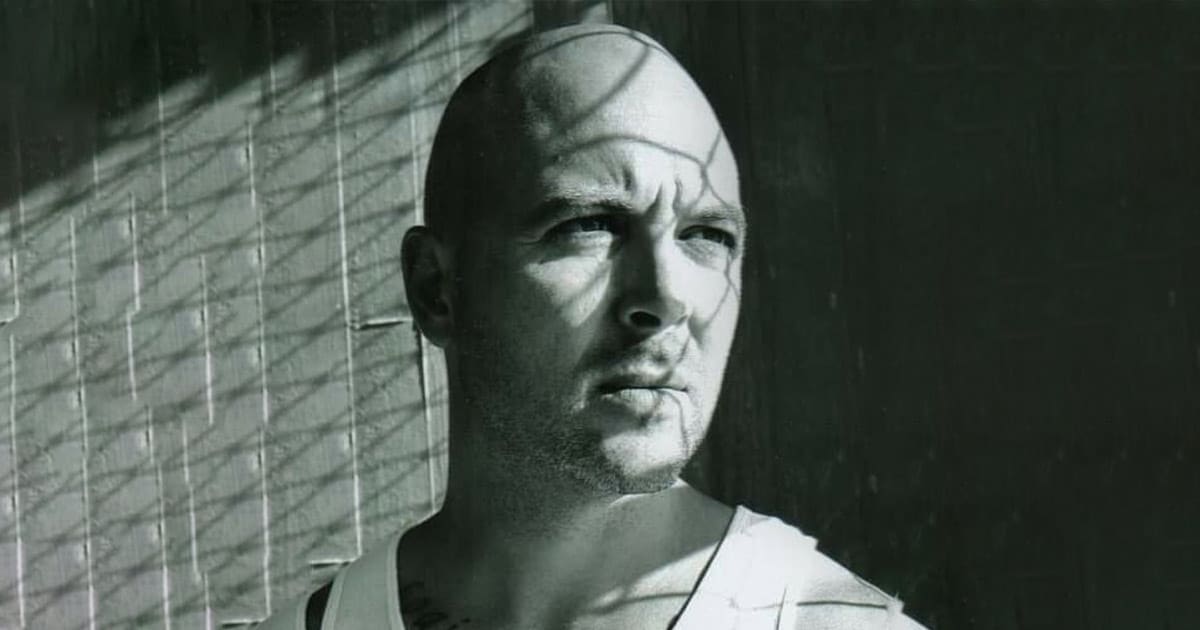“Scarmazzo pack it up”.
If you have ever served any time in jail or prison, you will understand the importance of hearing your last name followed by the words “pack it up”.
We certainly do, and now after 14 long years, so does Luke Scarmazzo.
While on a call with Luke since his release two weeks ago, we spoke about how it must have been agonizing for him to go that long hearing friend after friend get released, while never knowing when his name might get called.
We have been advocates for Luke for many years now and we are ecstatic to see him finally free from his unjust prison sentence…for a plant.
Being locked up previously ourselves for cannabis, we understand completely the roller coaster of emotions that it puts you through. Which is why our questions for Luke were different than what he has probably answered previously.
Bill: What were your last few hours in jail like?
Luke: Pretty crazy. You never expect a judge to make a ruling on a Friday, first of all.
Anyway, Friday morning I get up and start my usual routine, make some coffee and am about to work out to get the day started. I jumped on my email real quick, and immediately noticed more emails than I’ve ever had before. The first one I see is from my lawyer Kerrie Covell Dent, and the subject line is “YOU’RE A FREE MAN!”.
So I’m like…holy shit. I’m just staring at this email…just in total shock.
It has been such a long road, is this really over? Is it done?
I log out, put my coffee back in my cell, and I actually had to go back and read the email again just to make sure it was real and said what I thought it did.
After that, I’m just walking around the unit in a bit of a daze, and the guys I usually work out with asked if I’m up for today, and I replied that I’m gonna have to miss today. They looked at me sideways cause we always hold each other accountable, and I told them I just got a message from my lawyer and I needed to figure it out.
Kerrie explained to me that the prison doesn’t even know yet because the ruling came from California and to be patient because the offices aren’t open yet. A few hours later, the staff pulled me into an admin unit and let me know that I was granted immediate release, and would be processed out by 4 pm that afternoon.
Now everyone knows the regular routines in prison, so when I come back out to the main area a few of my guys asked me right away…you got out, didn’t you?
I answered yes, and it was just overwhelming love from everyone in the unit. All different guys, all different walks of life, just showing me love. When you’re in a situation like that, hope for anyone is really a boost of positivity for everyone.
I walked to my cell, grabbed all my photos and legal paperwork, and told the guys you can have everything else. Thirty minutes later I was gone from the compound.
Jeff: Did you know in advance about your release?
Luke: I didn’t really know I was getting out ahead of time. We’ve had this motion filed since early 2019, and because the prosecutors cleverly classified me as a continuing criminal enterprise in addition to
my cannabis charges, I wasn’t eligible for a standard sentence reduction.
There was also no established case law around the changing legal landscape of cannabis with regard to how the DOJ and the states were treating it.
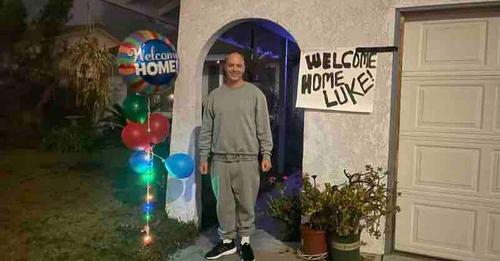
Bill: What was the first few hours after release like?
Luke: It was a bit surreal. I didn’t really have a concept of what freedom was anymore, so I wasn’t sure what to do. The world and everyone in it was still in 2008 in my mind, like all my cousins were still small and my friends were all younger. That’s the images I had in my mind, but they weren’t really real so I wasn’t sure what to expect.
So they gave me my exit packet with my belongings and my flight itinerary. I had to buy my own ticket because they only pay for buses, and the bus ride would have been 66 hours long. They also gave me a prepaid Visa card, then just walked away leaving me in the lobby, unsure what to do next. Can I leave?
One of the other guards walked me out to the front gate, where the town driver is waiting in a van. He’s the guy who takes you to the halfway house, the bus station, the airport, and wherever you need to go after release.
So I hop in the front seat, which is a totally different feeling because you never do that normally in these vans. He had to remind me to put my seatbelt on, cause I’m used to being in the back chained and shackled to the van.
I had about an hour and a half drive to the airport in Jackson, so I asked the driver if we could stop and grab some food cause I’m starving. I spot a Pizza Hut and even though it’s not my favorite, I’m there cause I just love pizza. So I get a medium pepperoni pan pizza and I’m just staring at it.
I pick it up, take that first bite, and the taste just exploded in my mouth, like holy shit! After fourteen years of the worst food you can imagine, I had basically forgotten what real food even tasted like. The driver couldn’t stop laughing at me because I’m just tripping out on this pizza.
We finally get to the airport and I go inside, looking to call my daughter before I board the plane. We had talked in the morning but I was still in the prison, I wanted to let her know this is real and I’m actually free and outside.
I ask one of the security guards where the payphones were, and he looked at me like I was crazy. That’s when I realized I was stepping into a time warp, and a lot of things aren’t going to be the same anymore.
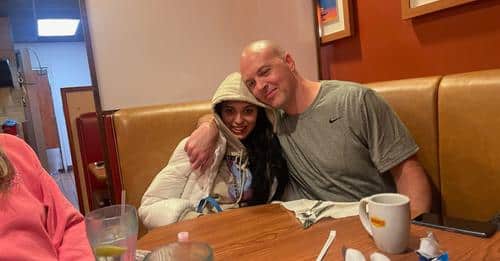
Jeff: That has to be a really uncertain time because it almost feels as if the world has passed you by for the last decade and a half. The last questions we have are what is the one thing you want to tell people about your ordeal? What do you have planned for your future?
Luke: I want to make it 100% clear, even though I’m out, this doesn’t stop. My advocacy to continue to circle back to the men and women still incarcerated for cannabis is one of my primary goals.
I’m taking a couple of weeks to reconnect with the family and enjoy my new freedom, but then it’s back to work. I was an advocate before my arrest when I started my dispensary back in 2004. Just being in prison and experiencing the loss, the depravation, and all the challenges that present themselves, I really understand how important it is to get everyone still in there out.
I want to make sure that it’s 100% clear that I’m coming back for them. I’m not leaving anyone behind and I’m diving in head first. Whatever that means, going to D.C. to talk to lawmakers, to advocate locally, I’m down to do it.
One thing I want to make clear is that I didn’t get clemency under Obama. I didn’t get it under Trump. If I had gotten it from one of the presidents, I would have just gotten out and still been an advocate, but my story wouldn’t be as impactful.
Because of how this judge let me out, because of the language he used in a twenty-nine-page opinion, and because of how strongly it supports the changing of the cannabis landscape, all the cannabis prisoners can use my argument and use the language from that opinion.
Instead of just getting a clemency grant, we have ammunition now. I can go back to the men and women still incarcerated and say file these compassion release motions. I’ll show you how to do it, I’ll help you do it, and I’ll show you the language you can use.
Now we have language that these judges can use as cover and have a precedent to cite as to why they grant releases.
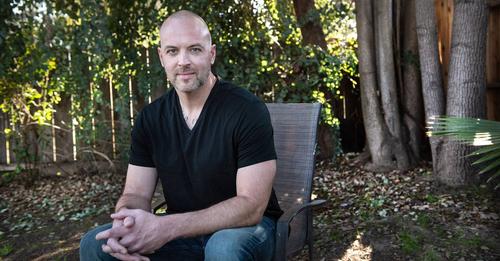
Bill: I love that, you had to live it and find your own lane, and now you can help other people with it. Sounds like you’re following a similar path to Weldon Angelos and Randy Lanier when they got out, looking to help people who are in the same situation as you.
We’re going to have a group of 5-10 of you guys who will look back on things in 10 years or so and say, man, look at all the people behind us that we were able to help regain their freedom.
Luke: I look forward to the work we’re going to do together with Mission Green and Freedom Grow, there’s nobody that I’m not willing to work with to achieve our goals. I’m just ready to hit the ground running and get people out.
Jeff: Do you have plans to establish your own advocacy group or organization?
Luke: I’m going to jump into the existing infrastructure they have in place. I feel like if I started something new I would just be taking focus away from the existing groups that are doing such good work. I don’t want to waste any time establishing a 501c and all that when I can be sending that time helping people get out.
Until every single cannabis prisoner is free, and I mean every one, I’m working.
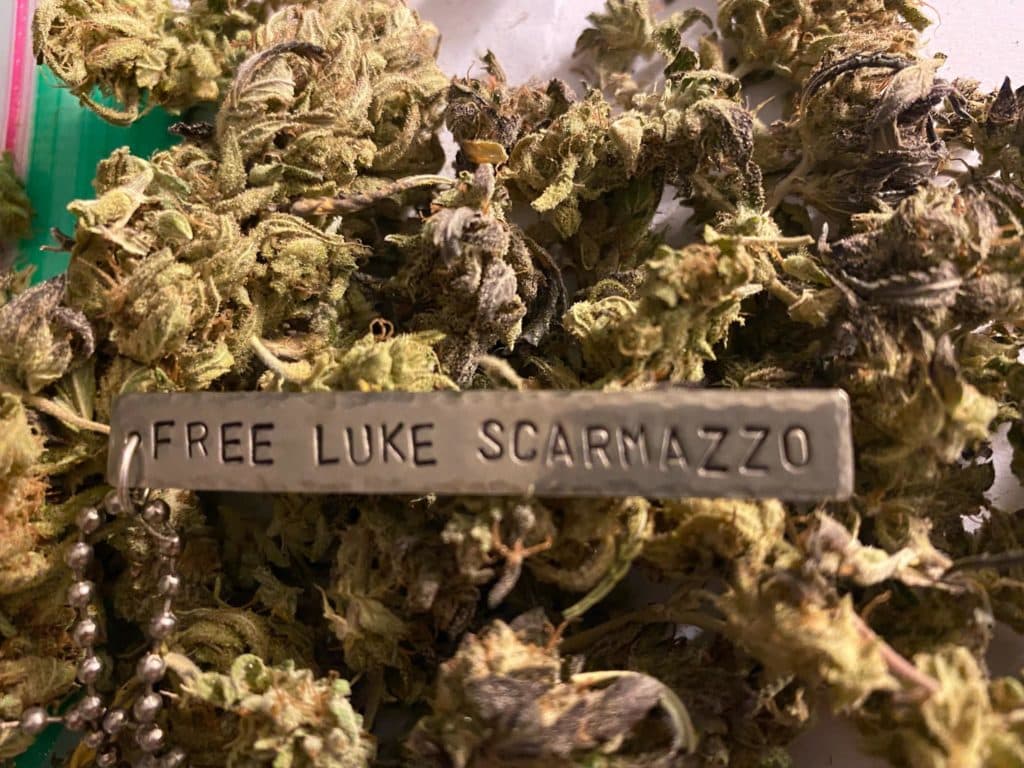
Jeff: After speaking with Luke, we reached out to Kerrie Covell Dent, his lawyer from King & Spalding, for her feelings on his case and its ramifications.
Kerrie: It has been a privilege to work with Luke Scarmazzo over the past few years. He is extraordinarily bright and talented, and I have no doubt that he will make a difference in the world now that he has been granted compassionate release.
Luke spent almost 15 years in federal prison for a non-violent, victimless marijuana offense because of a mandatory minimum sentence. He faced adversity with courage and compassion, always focusing on the impact of his imprisonment on his daughter and his parents rather than on the detriment to his own life.
Bill: We couldn’t agree more Kerrie. Why is this judge’s decision so important, and how it can potentially be used as a precedent for future cannabis prisoners to earn their compassionate release?
Kerrie: Judge Drozd’s thoughtful, well-reasoned opinion reached the right result, granting Luke’s request for compassionate release based on a “unique confluence of circumstances.” One of the factors he considered was the dramatic change in the legal landscape concerning marijuana use and distribution since Luke was sentenced. The changing marijuana landscape does not, in itself, warrant a compassionate release. But Judge Drozd found that he had broad discretion to consider the harshness of Luke’s mandatory minimum sentence in light of the current marijuana landscape in combination with other factors (which included the disparity between his sentence and that of his co-defendant, his good behavior in prison, and his family circumstances).
Hopefully, other courts will follow suit and consider the changes in the marijuana landscape when ruling on prisoners’ motions for compassionate release. Our prisons are overcrowded, and it would be great to see more non-violent offenders granted compassionate release whenever extraordinary and compelling circumstances warrant it.
If this is your first time reading about Luke’s case, below is a summary of his release and more details about his arrest.
On February 2nd, a federal court granted the early release of a man imprisoned for 14 years for his role in operating a state-legal medical marijuana dispensary in California. The judge recognized that compassionate release is warranted, partly due to the dramatic shift in the legal landscape for cannabis.
In 2006, Luke Scarmazzo was 26 years old when he faced federal charges with the California-based dispensary. He was sentenced to 21 years in federal prison for his involvement in the activities before the Justice Department explicitly took a hands-off policy to state marijuana programs.
Activists have extensively cited his story as an example of the need for substantial reform. Weldon Angelos, who won a presidential pardon under the Trump administration for a cannabis conviction and has since become a vital role in the clemency and drug policy reform movement, is one of them.
The Man They Tried To Make An Example
According to the advocacy group California NORML, Scarmazzo is the final federal prisoner held for a California medical marijuana charge. He and other nonviolent cannabis offenders—precise number unknown—attest to the excesses of the War on Drugs since firms now produce and harvest pot on an industrial scale on a state-legal basis. He was scheduled for release in 2027.
Scarmazzo and his business partner, Ricardo Montes, founded the California Healthcare Collective medical cannabis dispensary in Modesto, California, in 2004. Even though their business was allowed under Proposition 215, which legalized medicinal production, sales, and consumption in the state, cannabis remained illegal under federal law. The DEA raided the dispensary in 2006 and detained Scarmazzo and Montes.
Scarmazzo and Montes were both charged with the same offenses in federal court and sentenced in 2008. They were charged with conducting a continuing criminal business, which is informally known as the “Kingpin Statute,” in addition to marijuana manufacturing and possession with intent to distribute. It is typically used against criminal groups, such as cartel operations, and has a required minimum sentence of 20 years in jail. He was sentenced to 22 years in prison.
Angelos, who called Scarmazzo to deliver the news, said Luke’s case is one of the most terrible in our criminal justice system because he followed state law but was punished like a drug kingpin by the federal system.
Angelos and Scarmazzo met in prison, where they served seven years together. Angelos promised his friend that he would fight for his release, and that promise was fulfilled on Thursday with a ruling from the United States District Court for the Eastern District of California. There is an overwhelming sense of relief now that Scarmazzo can return home to his family and start over after serving 14 years in prison.
According to Judge Dale Drozd’s 29-page order, various considerations led the court to conclude that Scarmazzo deserved compassionate release, which is reserved for cases with “exceptional and compelling” reasons for relief.
His co-defendant, the dispensary’s CEO, who faced a similar conviction, was pardoned by the Obama administration. His family is going through personal difficulties, especially his father who is battling terminal cancer. He was good in prison and had the resources and employment chances to succeed.
Angelos also hopes that the judge’s viewpoint on the shift in marijuana policy and enforcement would set a precedent that will persuade other federal courts to approach cannabis matters with comparable discretion.
The court also admits that Congress has routinely adopted an appropriations rider that prohibits the Justice Department from interfering with state medical cannabis programs since 2014. It also cited remarks by U.S. Supreme Court Justice Clarence Thomas, who commented on the federal government’s “contradictory” and “unstable” marijuana policy posture in 2021.
In addition, marijuana offenders convicted of federal crimes appear to receive much lower sentences than in the past. The undersigned does not doubt that those who violate still-existing federal marijuana laws today are treated very differently by the national criminal justice system than those who engaged in similar conduct during defendant Scarmazzo’s unlawful conduct and his prosecution, conviction, and sentencing in this federal court.
These policy concerns may not have been sufficient to merit compassionate release under the present criteria. Still, the judge makes it apparent that Scarmazzo’s arguments cannot be dismissed entirely: The times have changed, and it makes less and less sense that some could spend decades in prison. In contrast, others are regarded as real business owners who are generally unburdened by the fear of federal prosecution.
Better Late Than Never
Scarmazzo’s case has always been controversial, given that he worked within the legal framework established by California Proposition 215 and SB 420, which allows medical marijuana patients to grow, possess and use cannabis for medicinal purposes with their physician’s recommendation.
In an ideal world, Scarmazzo would’ve been released in late 2016 when the Supreme Court ruled that federal authorities cannot prosecute individuals who comply with state law regarding medical marijuana activity. This ruling effectively meant that the federal government no longer prosecutes individuals involved in medical marijuana activities; however, this did not apply retroactively to individuals like Mr. Scarmazzo, who had already been sentenced for their crimes under previous laws.
Enjoyed that first hit? Come chill with us every week at the Friday Sesh for a freshly packed bowl of the week’s best cannabis news!
- Delaware’s Recreational Cannabis Market Finally Set to Launch After Years of Challenges
- Excise Tax Increase to 19% and Its Impact on California Retailers
- Nebraska’s Governor Approves Emergency Medical Cannabis Regulations
- We Must Advocate for Fair and Accurate Marijuana Impairment Testing Policies
- The Global Roots of Plant Medicine: Why Cannabis Has Always Been Part of the Plan
- Hawaii’s HB 302 Becomes Law After Governor’s Unexpected Reversal


